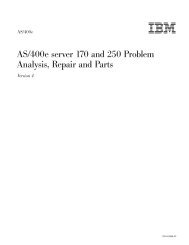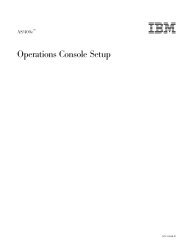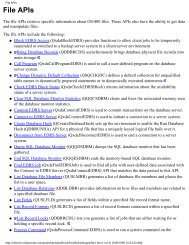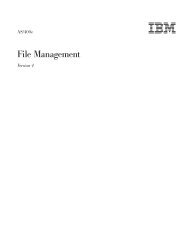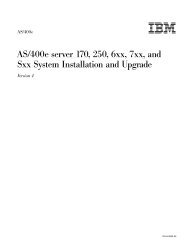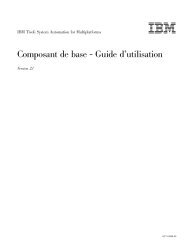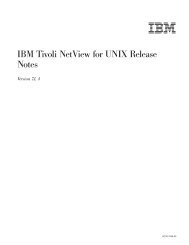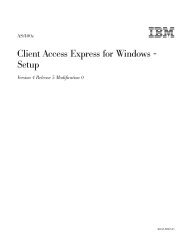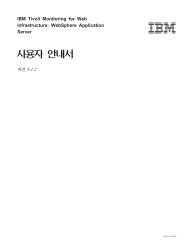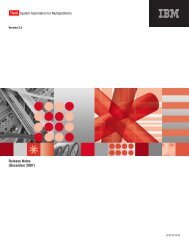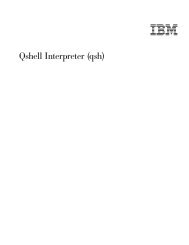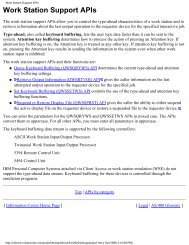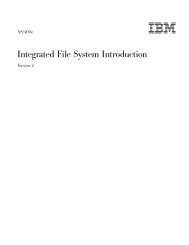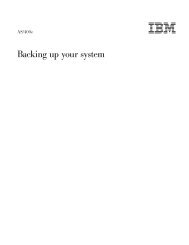Data Queue APIs--Categories - FTP Directory Listing - IBM
Data Queue APIs--Categories - FTP Directory Listing - IBM
Data Queue APIs--Categories - FTP Directory Listing - IBM
You also want an ePaper? Increase the reach of your titles
YUMPU automatically turns print PDFs into web optimized ePapers that Google loves.
User Space <strong>APIs</strong><br />
User Space <strong>APIs</strong><br />
You can use User Space <strong>APIs</strong> to create and delete user spaces, change and retrieve the contents of user<br />
spaces, and change and retrieve information about user spaces.<br />
User spaces are objects that consist of a collection of bytes used for storing user-defined information.<br />
They are permanent objects that are located in either the system domain or the user domain. They have an<br />
object type of *USRSPC and a maximum size of 16MB. You can save and restore user spaces to other<br />
systems. However, if the user spaces contain pointers, you cannot restore the pointers even if you want to<br />
restore them to the same system.<br />
You can use the user space <strong>APIs</strong> to:<br />
● Create user spaces to be used by list <strong>APIs</strong> to generate lists of data.<br />
● Store pointers.<br />
●<br />
●<br />
●<br />
Store large amounts of data. You can create a user space as large as 16 megabytes. You cannot<br />
create a data area larger than 2000 bytes.<br />
Save information in user space objects, and save and restore the object with the information in it<br />
using CL commands.<br />
Pass data from job to job or from system to system.<br />
Note: If the allow user domain (QALWUSRDMN) system value contains only the QTEMP library,<br />
you can only use the user space through <strong>APIs</strong> unless the user space is in QTEMP. You cannot use<br />
the Retrieve Pointer to User Space API. Refer to the Security - Enabling for C2 book for more<br />
information.<br />
The user space <strong>APIs</strong> include the following:<br />
● Change User Space<br />
(QUSCHGUS) changes the contents of a user space.<br />
● Change User Space Attributes<br />
(QUSCUSAT) changes the attributes of a user space object.<br />
● Create User Space<br />
(QUSCRTUS) creates a user space.<br />
● Delete User Space<br />
(QUSDLTUS) deletes user spaces created with the QUSCRTUS API.<br />
● Retrieve Pointer to User Space<br />
(QUSPTRUS) retrieves a pointer to the beginning of a user space for a high-level language (HLL)<br />
that supports pointers. HLLs that support pointers can use this pointer to manipulate the contents of<br />
a user space directly.<br />
● Retrieve User Space<br />
(QUSRTVUS) retrieves the contents of a user space. It does not retrieve descriptive information<br />
about the user space, such as its size.<br />
● Retrieve User Space Attributes<br />
(QUSRUSAT) retrieves information about creation attributes and current operational statistics of<br />
http://infocntr.rchland.ibm.com/pubs/html/as400/v4r5/ic2924/info/apis/obj5.htm (1 of 2) [10/4/1999 2:34:44 PM]



